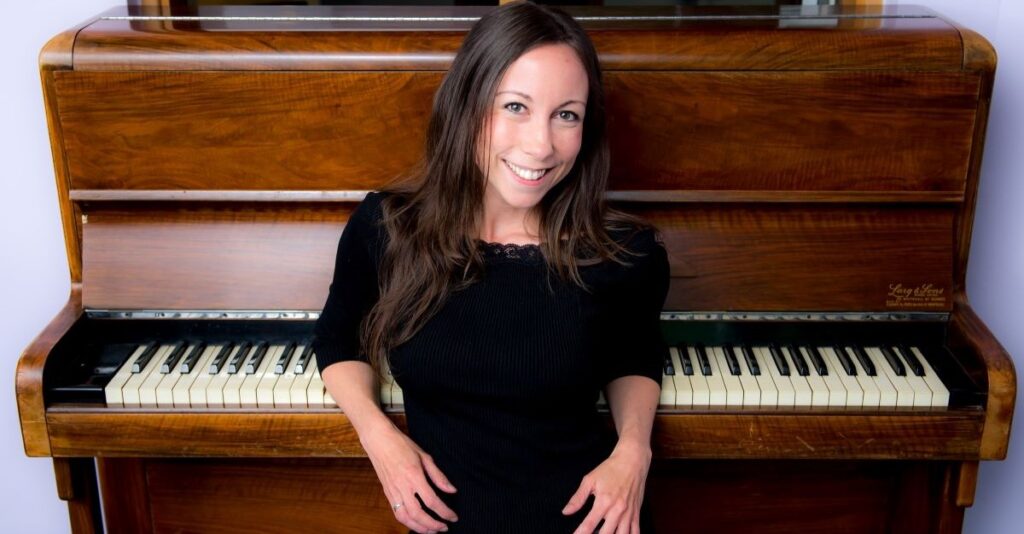
Life With a composer: ‘Queen Margaret of Scotland was an extraordinary woman, I wanted to celebrate her’
Scottish composer Helen MacKinnon on leaving her job to peruse her music career and taking inspiration from Queen Margaret of Scotland for her latest work.
I get up around 7.30am. We live beside a rail track in Perth so are usually woken by the first train of the day rattling past the window. My faith is central to my life, so I start the day with prayers – being grateful for life’s blessings and finding focus for the day ahead (supported I might add, by a cup of coffee.)
Creativity always flows best in the afternoon, so mornings are usually more administration focused. Afternoons are when I focus on writing new material. Every day is different in terms of the composing process and output. Some days are more productive than others. You just have to go with the creative flow. We recently moved into an old house over 100 years old. I have a little study with big bay windows and beautiful cornicing. It has this innate feel of having been a ‘music room’ in its day and serves perfectly as a place for creating.
Tonight (15 March) at Greyfriars Kirk in Edinburgh, Edinburgh University Music Society Symphony Orchestra will be performing the world premiere of my new orchestral work, The Pearl of Scotland. It’s about Queen Margaret of Scotland and I think it’s the first ever orchestral work written about Scotland’s great female saint.
‘I was stuck by how she balanced these demanding roles of wife, mother, and advancer of the arts’
I had the chance to visit the Netherlands and Belgium on a retreat with some good friends who are religious sisters, where we took part in a procession. I was part of the Scottish contingent and was dressed as Queen Margaret and carrying a relic of St Margaret of Scotland. I found it profoundly moving. I arrived back in Scotland and started learning more about this very interesting woman who I knew a little, but not a lot, about. It was quickly apparent that she was an extraordinary individual. I was stuck by how she balanced these demanding roles of wife, mother, advancer of the arts and religious reform in Scotland and devotee to the poor. Her husband King Malcolm III was known to be illiterate, so he relied on St Margaret for support and it was evident she had a significant and positive influence on him and his life. The work reflects Margaret’s early years and culminates in the celebration of her Queenship and Sainthood.
‘The piano and I were inseparable for my teenage years’
I studied music at The University of Glasgow. At that time, 20 plus years ago, my degree course wasn’t particularly industry focused, so I graduated with little knowledge of how to make a living as a composer.
In 2015, everything changed. I decided to enter my first composing competition, judged by one of my composing heroes, the great film composer Ennio Morricone. I spent my Christmas holidays from work writing a new choral work and headed off to the post office to send the score to Italy, without a second thought that anything would come of it. A couple of months later, an email arrived from Italy detailing an award in the competition, and just like that, I was off to Florence.
The time in Italy led to a commission, which led to another, and suddenly there was a momentum building around a credible path as a professional composer. It’s continued to evolve organically since. I decided back then it was ‘now or never’ and resigned from a much-loved job to embark on a new adventure as a composer. It’s been eight years now and I haven’t looked back. I remember telling a colleague that I was leaving to be a composer. She looked at me incredulously, tilted her head and said with complete sincerity ‘But I thought all composers were dead?’
I’ve been writing music in some form or another since I was a teenager. I grew up learning piano and violin from an early age and singing in the church choir. Although I had a childhood immersed in playing music, I struggled to connect with music emotionally as a young performer. There was always something reserved or restrained. Looking back, it was likely performance nerves and shyness. But through composing, I found a new avenue for self-expression. It allowed me to be creative, opening myself up emotionally, but always ‘behind the scenes’ and without the performance pressure.
I remember distinctly the first day I realised I could write my own music and the excitement that followed. The piano and I were inseparable for my teenage years. I was always jotting down melodies and ideas. I had a summer job at Boots as a teenager and I kept this little notebook and pencil in my pocket so I wouldn’t miss any moments of inspiration. I was always sneaking a little scribble when no one was looking.
‘There’s nothing better than music to relax after work’
I used to keep really late hours, working well into the evening, but more recently got the work-life balance into shape, and I’m usually in the kitchen fixing dinner by around 6pm. I’m a reluctant cook and rarely make it to the kitchen without my husband popping his head into my office to remind me that it’s my turn to cook and the clock is ticking!
Evenings are normally spent at rehearsals – either conducting a choir or playing in a local orchestra – or relaxing by watching a movie with my husband or reading. There’s nothing better than music to relax you after a working day.
Read more from the Life With series here.
Subscribe to read the latest issue of Scottish Field.
TAGS

